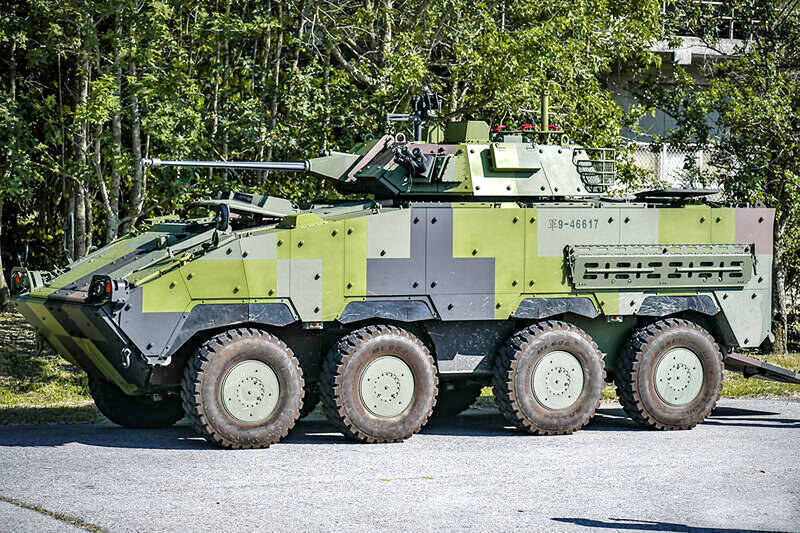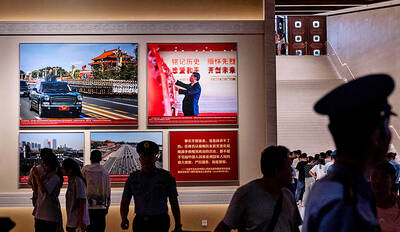The military is investing NT$1.48 billion (US$46.26 million) over five years to upgrade Taiwan’s fleet of CM-32 Clouded Leopard armored personnel vehicles (APVs) and its variants after numerous reports of issues in the mainstay of the nation’s ground troops.
The funds are to be spent on an “eight-wheeled APV maintenance project,” with next year’s NT$50 million marking the first year of the project, the Ministry of National Defense’s proposed budget for the next fiscal year showed.
More than 50 vehicles reported cracks in their bulletproof plating in July and last month, including 27 CM-34s, the variant armed with 30mm autocannons manufactured within the past two years, and 23 CM-32s and CM-33s that have exceeded warranty.

Photo: Taipei Times
The army first discovered the cracks in July last year, the Armaments Bureau said.
As of Aug. 1, the military had swapped out the front swash plates for two vehicles and soldered the cracked plates of 42 vehicles, the bureau said.
Repeated tests show that the repairs would not affect the vehicles’ bullet-resistant capabilities.
The army is in talks with contractors on possible causes, the source said.
The source added that despite the bureau’s claims that repairs have been carried out, the ministry’s budget for next year shows that other issues need fixing.
In addition, the Clouded Leopard series has experienced persistent problems with the hydraulic pumps and power chassis, primarily because the APV contractors purchased low-grade hydraulic pumps when manufacturing the vehicles in 2015.
Many of the vehicles with issues are currently in service, and it was impossible to correct them all at once, the military said.
Thirty-three people were indicted in October 2015, including military officers and contractors, after an investigation found evidence of bid-rigging, bribery, fraud, misconduct in not carrying out proper testing and other illegal activities.
Contractors imported refurbished hydraulic pumps from China for NT$35,000 per unit, but charged the ministry NT$150,000 each, and recorded steering mechanisms that cost NT$23,000 per unit as NT$190,000 each, the investigation found.

Three batches of banana sauce imported from the Philippines were intercepted at the border after they were found to contain the banned industrial dye Orange G, the Food and Drug Administration (FDA) said yesterday. From today through Sept. 2 next year, all seasoning sauces from the Philippines are to be subject to the FDA’s strictest border inspection, meaning 100 percent testing for illegal dyes before entry is allowed, it said in a statement. Orange G is an industrial coloring agent that is not permitted for food use in Taiwan or internationally, said Cheng Wei-chih (鄭維智), head of the FDA’s Northern Center for

The Chinese military has built landing bridge ships designed to expand its amphibious options for a potential assault on Taiwan, but their combat effectiveness is limited due to their high vulnerability, a defense expert said in an analysis published on Monday. Shen Ming-shih (沈明室), a research fellow at the Institute for National Defense and Security Research, said that the deployment of such vessels as part of the Chinese People’s Liberation Army (PLA) Navy’s East Sea Fleet signals a strong focus on Taiwan. However, the ships are highly vulnerable to precision strikes, which means they could be destroyed before they achieve their intended

About 4.2 million tourist arrivals were recorded in the first half of this year, a 10 percent increase from the same period last year, the Tourism Administration said yesterday. The growth continues to be consistent, with the fourth quarter of this year expected to be the peak in Taiwan, the agency said, adding that it plans to promote Taiwan overseas via partnerships and major events. From January to June, 9.14 million international departures were recorded from Taiwan, an 11 percent increase from the same period last year, with 3.3 million headed for Japan, 1.52 million for China and 832,962 to South Korea,

REWRITING HISTORY: China has been advocating a ‘correct’ interpretation of the victory over Japan that brings the CCP’s contributions to the forefront, an expert said An elderly Chinese war veteran’s shin still bears the mark of a bullet wound he sustained when fighting the Japanese as a teenager, a year before the end of World War II. Eighty years on, Li Jinshui’s scar remains as testimony to the bravery of Chinese troops in a conflict that killed millions of their people. However, the story behind China’s overthrow of the brutal Japanese occupation is deeply contested. Historians broadly agree that credit for victory lies primarily with the Chinese Nationalist Party (KMT)-led Republic of China (ROC) Army. Its leader, Chiang Kai-shek (蔣介石), fled to Taiwan in 1949 after losing a